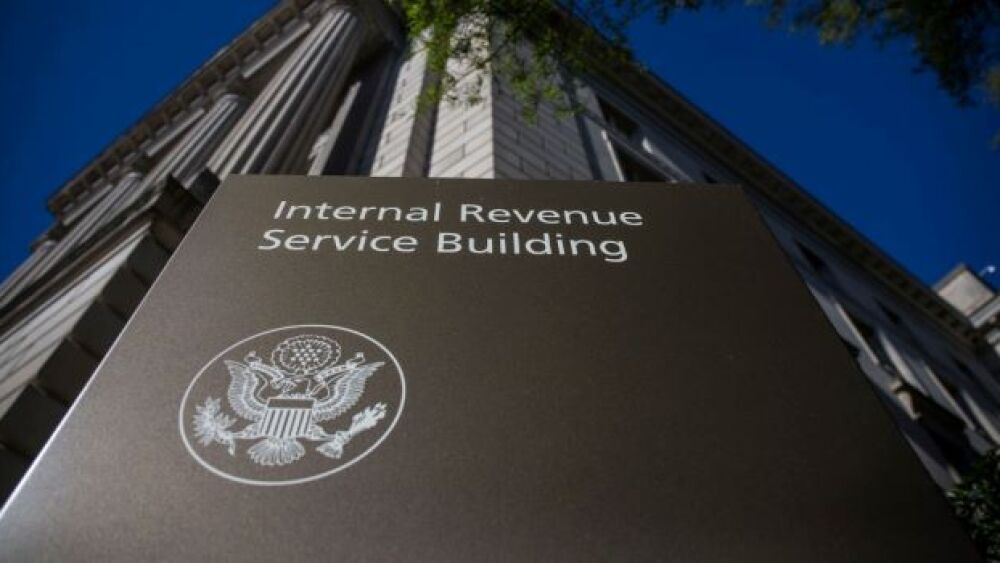In a statement, the company said, “Bristol Myers Squibb is in compliance with all applicable tax rules and regulations. We work with leading experts in this area and will continue to work cooperatively with the IRS to resolve this matter. Beyond that, we don’t comment on ongoing regulatory matters.”
Zach Gibson/Getty Images
Back in 2012, Bristol Myers Squibb attempted to set up a subsidiary in Ireland, which has a lower corporate tax rate than the U.S. The point of this particular scheme was known as amortization, where companies can write off the value of an asset, such as patents, from their taxable income over a specific time period.
In this case, Bristol Myers Squibb had already written off the patents in the U.S., and planned to move those rights to Ireland, where the value of the patents hadn’t been written off yet. The Irish amortization helped offset taxes in the U.S. And now in the U.S., IRS is going after the back taxes, which could be worth up to $1.4 billion.
This is one of a number of ploys larger, international companies use to avoid paying taxes in the U.S. More notoriously, for a while, were so-called tax inversions. A tax inversion is when a U.S. company buys a company that is based in a country with a lower tax rate than the U.S., then shifts its headquarters to that country in order to get the lower tax rate.
This was essentially what Pfizer was attempting to do in 2016 when it planned to acquire Dublin-based Allergan for $160 billion. In a surprise move, however, the U.S. Treasury Department under the Obama Administration released a new set of rules to make it more difficult for U.S. companies to conduct tax inversions. Shortly afterwards, the deal was called off.
Part of the Tax Cuts and Jobs Act of 2017 was to dramatically decrease corporate tax rates under the theory that U.S. companies would then spend less effort on avoiding taxes with a variety of offshore maneuvers. It basically reduced the top corporate income tax rate from 35% to 21%, which brought the U.S. rate below the average for most other Organisation for Economic Co-operation and Development countries. The argument against this is that through various other approaches, U.S. corporations rarely actually paid 35% in U.S. taxes.
According to The New York Times reporting, in 2012, Bristol Myers Squibb’s effective corporate tax rate was -7%, while it was 25% in 2011. During the company’s 2012 fourth-quarter conference call, the difference was so dramatic that analysts questioned company executives about it, but they refused to answer.
Reportedly, Bristol Myers Squibb’s scheme received the seal of approval from two corporate auditing firms, PwC and White & Case in late 2012. And this was after Merck had been hit by the IRS in 2006 for a similar offshoring ploy that saved $1.5 billion in federal taxes over 10 years. In that case, Merck set up a subsidiary in Bermuda in partnership with a British bank. It then transferred patents related to Zocor and Mevacor to the new subsidiary, then paid the subsidiary for use of the patents. Or, as The Wall Street Journal noted, “The arrangement in effect allowed some of the profits to disappear into a kind of Bermuda triangle between different tax jurisdictions. The setup helped Merck slash $1.5 billion off its federal tax bills over roughly the next 10 years.”
In a 2018 report by Oxfam International, the organization alleged in their report, “Prescription for Poverty,” that Pfizer, Johnson & Johnson, Abbott, and Merck & Co. dodged an estimated $3.7 billion in taxes in nine developed countries between 2013 and 2015, with $2.3 billion of it avoided annually in the U.S. The other countries included Australia, Denmark, France, Germany, Italy, New Zealand, Spain and the UK.
The IRS investigation is continuing into Bristol Myers Squibb, and will likely evaluate whether PwC and White & Case skirted the law in addition to Bristol Myers Squibb in how the deal was created and verified.
In a statement, the company said, “Bristol Myers Squibb is in compliance with all applicable tax rules and regulations. We work with leading experts in this area and will continue to work cooperatively with the IRS to resolve this matter. Beyond that, we don’t comment on ongoing regulatory matters.”





